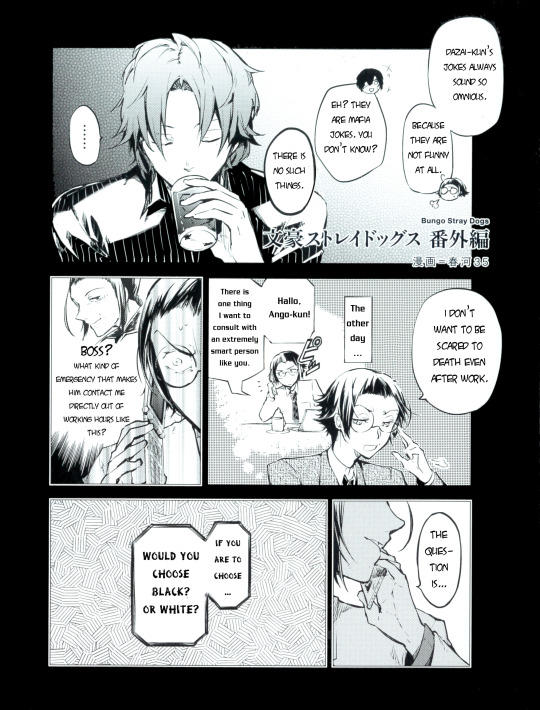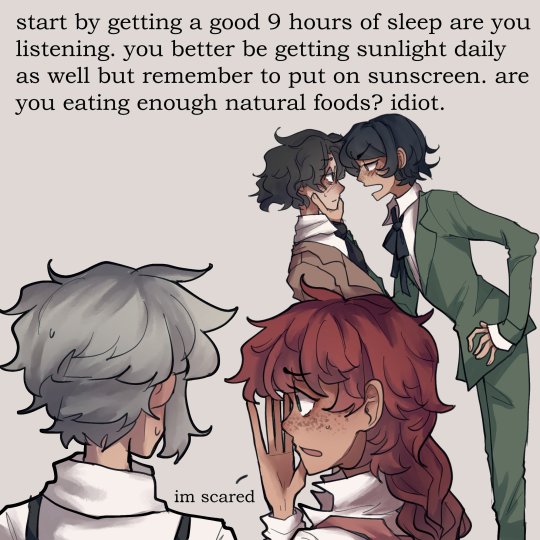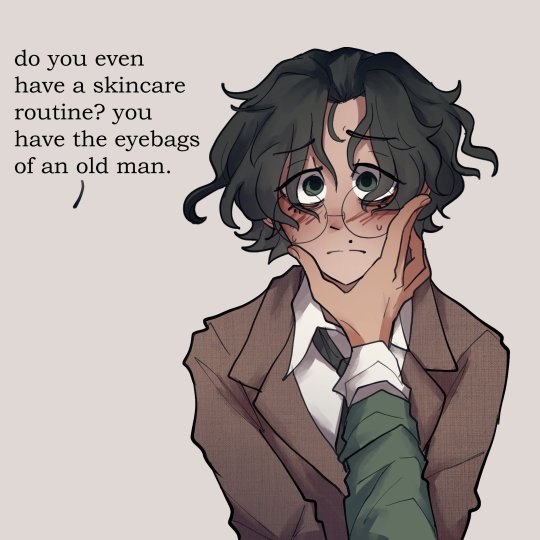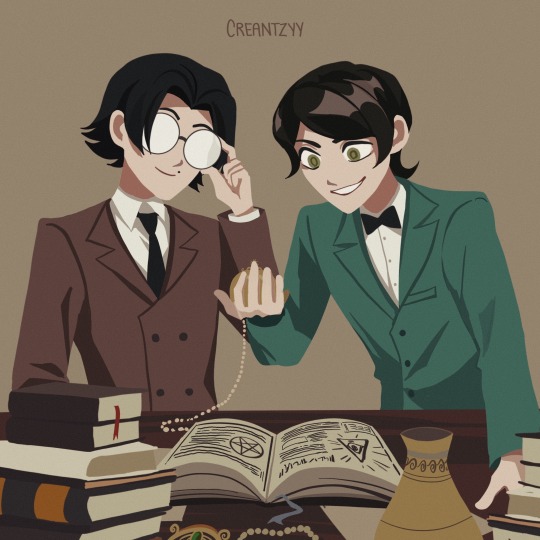Mori & Dazai brainrot — free Palestine 🇵🇸 — ☭ — brazilian 🇧🇷🇧🇷🇧🇷
Don't wanna be here? Send us removal request.
Text
Akutugawa being a vampire and Atsushi being a werewolf is proof that bsd is a plot to bring back trashy 2000’s monster romance books and return twilight to its former glory.
#sskk being twilight fans and the actual twilight plot wasn't in my 2025 bingo card but here we are#does it mean they're edward x jacob?
79 notes
·
View notes
Note
how do you think sskk's first kiss would go?
Sskk don't kiss they just do shit like this and we all have to cope


149 notes
·
View notes
Text


BSD anime DVD vol 8 omake
A few people have asked me about this and I'm sure I have seen the translation somewhere but I couldn't find it now so I just translated it again.
PLEASE DO NOT REPOST/REUPLOAD OUT OF TUMBLR. THANK YOU.
827 notes
·
View notes
Text



forgot to post this here but i need everyone to look at mushiango
2K notes
·
View notes
Text


This is my coming out as a Mushiango enjoyer 🫡🫡🫡 I just think they’re neat. Silly bbygirls.
4K notes
·
View notes
Text
Went on Bluesky to talk about how odd it was that Eve’s death wasn’t documented in the Bible and I had a bunch of people randomly bring up Adam to call him this abusive, misogynistic monster who hates his wife and forced her to have two kids with him.
The consequences of pop culture influencing how people view religious characters lol.
#i wish people could do biblical retellings in more creative ways in general#especially by understanding the actual text and historical context rather than just making meaningless subversions like this
1K notes
·
View notes
Text
Little ranting ( I know for a change) but
(warning : discussion of vanijeanne if you dislike this ship don't read)
Vanijeanne is that sort of ship you know is a real media literarcy test for people
And to clarify
I don't mean "people who dislike it because of how it's a toxic realtionship" that is perfectly valid
I mean the people who say stuff such as "it completely ruined Jeanne's character, she used to be cool and badass and now she is all blushy mushy" or "Jeanne is a girlboss she doesn't need a love interest especially one that cheapens her character to "cute uwu blushing waifu" or "vanijeanne is just shoujo trash and it ruins Jeanne's writing from a cool woman to just a "love interest", in short mainly critics of how it affected Jeanne's character and how she went from a "cool girlboss" to "cute uwu anime girl"
I am going to be harsh but someone needs to say it : Jeanne was never a "cool badass girlboss" and if you still think she is, I beg you to re-read the manga with close attention with the Gévaudan arc in mind
Jeanne as she appears at the begining of the story is a traumatized broken girl who bears a mask because she is told to by people
I think the Gévaudan arc made it very clear that Jeanne used to be closer to how she came to evolve then she ever was in chapter 1, look at little Jeanne

She was an energetic, lively kid honest with her emotions. To those who read PH, you might remember how Oz expressed admirations to the sincerity with which Alice expressed her emotions because he himself is unable to be as sincere with himself
Jeanne used to be Alice. She used to express herself with authenticity and you might be thinking it's to be expected, she is a kid, but she radicaly changes after her parents died executed in front of her very eyes

Her whole life is completely shaken by this whole event, this doesn't just mark the begining of a traumatic new life with a haunting traumatic memory but a life of objectification
The main chapter exploring what happened to Jeanne after her parents died and she is about to become a bourreau is called "POUPEE FISUREE - the essence of the witch", it literaly means "the essence of the witch is broken/cracked doll".
There are thousands of explanation you can theorize about what is Jeanne's exact nature but one thing is for sure is that she existed for the sole purpose of being used as a tool, she is objectified down to her very core

The dialogue is explicit enough but the fact the first "You are a doll" is a black speech bubble conveys the tone of the scene, you don't even see Jeanne's face, only elements meant to convey the fragementary aspect of this memory
It all began long before Jeanne was found and adopted by her parents, how exactly it happened isn't the point here, rather it's because she was with them she could live as an average child when she was not meant to
The transition between how Jeanne used to be and how she is after her parents are killed is brutal but here is the interesting bit, the parallel between this page and the following

"You are a bourreau, a tool" is presented in the exact same manner as "You are a doll"
Jeanne's reminiscene upon hearing this is enough to understand that "you are a bourreau" = "you are a doll" = because "you are a tool"
Jeanne immediately prooceeds to believe that what happened was a punishement because she did the contrary of "what she was told"
If what she was told was "don't think, don't want, don't wish" it's easy to understand that back then, when she used to be a all happy child she did think, want, wish and the fact that she expresses herself with sincerity was meant to reflect that, she didn't felt the pressure of her fate yet but now that her parents are dead and because she believes its a punishement for her disobeying, she now has a pressure put unto her shoulder to accept being objectified

The bottom of the page specfically, with a dead looking Jeanne, the text, and the image of bodies piles is enough to understand that Jeanne's lack of expression comes from the fact that she is broken, that she musn't disobey this time and that she embraced her condition as a tool and the meeting with Chloé is essential to understand the extent of her condition
When Chloé faces Jeanne, this is how the scene looks like from Chloé's pov


There is a clear contrast between Chloé's memories of Jeanne and the Jeanne that stand before her, it's not just a matter of growing up, the change of expression from an innocent smile to a bloody expression, the light colors used in the flashbacks vs the reality where Jeanne is cloacked in black, the use of screentoones making the scene shine vs the other scene being darken by screentones
From Chloé's pov, it's like the Jeanne of the past is gone and got replaced by someone completely different, even thought the similar hairstyle proves otherwise
As for Jeanne, from her pov the scene plays like this

She is conflicted between her new nature as a bourreau and her frienship for Chloé, she don't want to kill her but "she can't want anything", she doesn't have the right to, and while from Jeanne's pov this is just a flux of contradictory thoughts

This is HOW her internal conflict looks like to an outsider
Even though we thought the old Jeanne gone, she is still there, she is simply supressing herself due to the trauma, her survivor guilt enticing her to repress herself, her emotions, her true despire but she can't
This is one of the time where she let the mask slips, she can't go on, even if Chloé encourages her, she can't bring herself to kill someone she'd much rather protect than go on, she is completely tore apart between her feelings and her new condition that forbids it, this is specfically why Chloé let herself fall from the cliff, to spare Jeanne from having to live with the pain of having to kill her, but that was still too much for Jeanne


I hope I don't need to point out how deshumanizing of bourreau the way these vampires talk is, the words they use in regards to Jeanne just kin her to a doll, if you gave this page out of context to someone who doesn't know any better about VNC, it's likely they'll think the characters are talking about a literal doll ! She stopped "being useful", they want to "throw her away" because "she broke", this is like a kid talking about getting bored of his toys !

Jeanne's hair is very imporant to understand the difference between past and present jeanne in a visual language, her long hair showcases which Jeanne is talking but that's how Jeanne feels inside, much like how little domi is how presetn Domi felt inside
She has been used way too much as slaughtering doll to view any solution to the problem as other than killing, she has been told naught but that and the situation in Gevaudan is making all of it resurface
So knowing that Jeanne when we first meet her in vol 1 is a girl that has been objectificed all the rest of her life (not even mentionning that Jeanne is like.... centuries old), had to deal with survivor guilt over her parent's death, unability to do anything when facing Chloé and that now, apointed as a chevalier she is having constant anxiety over her condition as a curse bearer and constant fear to harm Lucas because she had to face losing all the people that mattered to her
Are you still going to call Jeanne a "girlboss" ? Are you still going to insist the story used to present her as a "strong female badass, cool and emotioneless" ???
It might come off that way when you read the story for the first time when no one knew anything more about Jeanne, but in retrospective it is obvious that in reality it was just a mask that Jeanne bore because of her being told she is just an object !
"she is the hellfire witch she is meant to be strong she doesn't need a man !" I hear, and I have to remind that Jeanne NEVER CLAIMED this title for herself, it was IMPOSED on her by people, this contributing to her objectification, not a way to sound cool. Jeanne would much rather be something else than the Hell fire witch and this is part of the reason why her relationship with Lucas is important, it gives her something to protect when she was a mindless killing doll after she had lost the people that mattered to her. Lucas himself state that jeanne doesn't need to kill anymore because even he can sense she doesn't enjoy her role as the "hellfire witch", all it entails and Jeanne's continuing on insiting to kill even almost to a reflex level reflect the extent to which she has been objectified to the point she just can't see another way
In these early chapters, she isn't strong, she is simply bearing a facade, a mask. A motif re-used later in the ball masque arc to indicate all characters hide their truth self behind a mask. So you'll excuse me for thinking that there is NO ground to call someone putting a facade due to her contasnt objectification at the ends of powerful vampires exploiting her survival guilt a "girlboss"
And no, her falling for Vanitas does not make her weak !
In fact, it wouldn't surprise me if the real reason why Sensei had Vanitas approach her in such a disturbing way was to make him come off as also objectifying her to better reverse this idea rather than "making a shoujotrash plot point" (do I need to point the misogynistic implications of calling this "shoujotrash" or)
By this point in the story we know nothing of Jeanne and Lucas doesn't seem to be using her, he cares about her, so when Vanitas forces a kiss on Jeanne because he got "zoku zoku" over witnessing Jeanne letting the mask slips for the first time when she believes Lucs is in danger, we are compelled to think that Vanitas is a jerk because he is being a creep to a woman without thinking upon whether or not other people did worse to Jeanne
But as the story progresses it becomes increasingly obvious Vanitas was not the only one nor the first person to do things without any consideration of Jeanne's personal feelings, in fact it's the opposite !! It's specifically because few people treat Jeanne right that she is so easily swayed away by any act of kindness !!

This is portrayed comically because we are from Domi's pov who has no real idea of what Jeanne had to go through (as seen per pondering on who in Jeanne's family committed a crime)
But the point is that Jeanne's weakness to kindness stems from 1) she is being hated and feared as the "Hellfire witch", another form of objectifcation 2) she has been reduced to a tool and goes along with it because of her survivor guilt 3) Jeanne is someone who is deeply kind hearted and caring, a "maiden at heart" and this isn't here just for gap moe's sake, it's there to show the extent of her situation
It is absolutely twisted that someone who is fundamentally innocent and naive about many things shows a face that compleltey contradicts these notions for the only reason being "she has to bear a mask, she has to force herself into not wanting anything"
Because she internalized the orders given to her to her core, she is not used to receive any act of kindness nor to enjoy herself or just live like a normal person, she doesn't have the right to according to her superiors
That's not even mentioning she doesn't have a lot of people around her and isn't used to healy relationship
We all already know she lost her parents and her frienship with Chloé ended tragically to the point it haunts her still, but who else is in contact with ?
Ruthven : he is her teacher and he spared her a dreadful fate but it's very obvious Ruthven keeps a lot of secret from her, he made her swore an oath and shee cannot even talk about her condition due to it

I think the way she pictures Ruthven in this scene says enough about their relationship not being the epitome of healthiness. Ruthven's feelings regarding Jeanne are very complicated no doubt, but this is still an unhealthy relationship where Ruthven has control over her in ways Jeanne herself doesn't necessarily realizes
Luca : while Luca treasures her (and has a puppy crush on her) and Jeanne wants to protect him at all costs, Jeanne is also haunted by the fear she might hurt him
Dominique :

She originally approached Jeanne to tease Noé and immediately starts to feel guilty upon realizing Jeanne is a "good girl" because of Jeanne telling her... basics facts. Like, you have to understand that this scene right here just confirms that Jeanne doesn't have many friends and that she even worry about people getting close to her either 1) because they might be in danger if she doesn't behave 2) because she might be a danger to them 3) because her bad reputation and status as a tool can put them in a pitch
I don't have the domijeanne mini comic, but Jeanne is aslo swayed by Domi's acting kind towards her and that's how they befriend but you have to keep in mind that Domi wasn't in the best place mentally either when she approached Jeanne
Ultimately while not "toxic" Jeanne can't exactly confide in fully because 1) She views Luca as someone she has to protect so they cannot be equals 2) Domi views Jeanne as a reflection of her weak self, thus as someone needing to be protected thus they cannot be equals
This doesn't exist with Vanitas, he can be approached as an equal. Yes, you heard that right. Yes, Vanitas approached her in the creppiest way possible and should have been put in a jail a second time, yes Vanitas was being terrible to her many times, yes be blacmailed her, yes there are endless jokes about how jeanne just dances in the plams of his hands and yes their relationship isn't by any stretch of the imagination a heathly relationship
That's the point and Jun sensei's owns it
Vanitas clearly approached her in such manner because he was still thinking about how much he isn't worthy of love and he can safely love Jeanne because with how he treats her, he can be sure she will never reciprocate any feelings he can have towards her
And because he approached her that way, Jeanne can more easily let the original fear she expresses (for example when Domi invites her to dancing) aside, this is how he progressively becomes someone Jeanne can relies on and thus, despite it looking like there is a power imbalance in favor of Vanitas, he is in reality able to be on equal terms
Most if not all of the Vanijeanne moment in the manga serves to flesh out Jeanne as a character which might be why detractors of the ship refuses to look past what it actually says about Jeanne's character in favor of a narrative where the "cool badass girlboss" has been ruined by the tiny rat doctor
However, they allow us to see past the "hellfire witch" facade and approach little by little to Jeanne's real core, but because she is still fundamentally conflicted and torn appart by her condition, she isn't able to reveal herself fully, not to mention she is still warry of vanitas but because she is wary of Vanitas she can talk to him without feeling inferior or unworthy of it
Vanitas quickly becomes the one person she relies on the most, not just for blood and yes this is very likely what Vani truly meant when he told her to drink only his blood, especially given how the second condition is "call me by name. Even if he purposefully acts unlikeable, Vanitas is still Vanitas, he sensed Jeanne needed help and he investigates it, Vanitas deep down is someone who is kind and selfless after all, even if he would rather cut his tongue than admit it
Vanitas doesn't really take off his mask in front of her unlike how he does with Noé because Noé constantly confronts Vanitas, Jeanne is very passive in contrast, the one time she begins to see through the cracks is during the cabin scene where her getting angry isn't amusing Vanitas (because he likes to see her emote instead of her putting the poker face) because she is trying to make him think of his own safety for once, you know ? Self care, the thing Vanitas hate because he hate himself so much he think himself underserving of love
That is ultimately why Jeanne ends up falling for him



Vanitas is the first person ever to tell her she has the right to want things, that she is more than a doll, to explicetely tell her to her face she can wish for something
Even if Luca and others treat Jeanne kindly, they didn't necessarily told her outright "you can desire things" and yes, this is largely because Noé's influence on him is showing but given how the previous intereactions with Jeanne didn't got him to blame Noé for him saying certains things and making certains promises, it's fair to assume that prior to these, the moment where he was being considerate where just... Vanitas being Vanitas. He might have kept his mask on, he is still like this
Ultimately Vanitas keep his promise and that's what enable Jeanne to move on from her internal conflict : because now, she has seen one of the people she cares about being saved. It didn't ended like her parents, it didn't ended like it used to in Gévaudan and it doesn't implicate any of the fears she has towards Luca (largely fed by these two bad ending to her past relationships), her friend is safe and she just let her happiness explode with no restrictions
By helping Chloé, Vanitas also helped Jeanne finally come to term with one of the biggest issue she had so far : think of herself as someone who has the right to live (you know, like Chloé)

This is what finally allows Jeanne to reconnect with how she used to be in the past and deliver a big bright unrestricted smile with later on appearances confirming that Jeannes expresses herself more sincerely and without any complex, Domi commenting on her shinning or her contribution to the Attraction park arc
Falling in love with vanitas didn't made her weak, it did the opposite : it helped her finally break free from a doll of the senate, to be herself again
Jeanne never wanted to be a "cool girlboos badass" and when she appears as the Hellfire witch, it's not what she was, she was a girl whose innocence was broken, who was objectified and taken advatange of for her survivor guilt and forced herself unto a mask, to stop thinking, wanting, desiring, living in short, a simple killing machine
She fell in love with vanitas not just because he was kind to her but because he helped her overcome a situation that could have easily put her in her past situation again, making her go through the same internal conflict as she did, because he told her she has the right to live as an individual and not a tool
And that's what allows her to finally overcome this, to finally be able to be true to herself
How exactly is any of this weak ?
Since when strong is when no emotions, cool, etc ??? You know what that is ? It's just pushing toxic masculinity standards unto women, which is what has been happening in the whole subgenre of the "girlboss" protagonist making these characters unsufferable
You don't have to like Vanijeanne, you have the right to dislike it because it's not a healthy couple, because it makes you uncomfortable, because you prefer others ships heck if you think that's so bad it prevents you from enjoying moments in VNC that is fine
but don't call a victim of severe objectification forced to hide her feelings because of her survivor guilt a "strong cool badass girlboss", dont use her name of Hellfire witch like it's something she claims and is proud of when it's been put on her by people as another mean of objectification and don't call her finally recovering from it "weak" or "cute uwu blushing anime waifu shoujo trash slop" or any of the nonsense I have seen
It's one thing to dislike a ship, it's another to completely miss the point of what Sensei is trying to accomplish in the first place
56 notes
·
View notes
Text

Working on more art to post in my incoming fics
65 notes
·
View notes
Text
hoshikawa the soukoku shipper of all time that you are I owe you my life

71 notes
·
View notes









